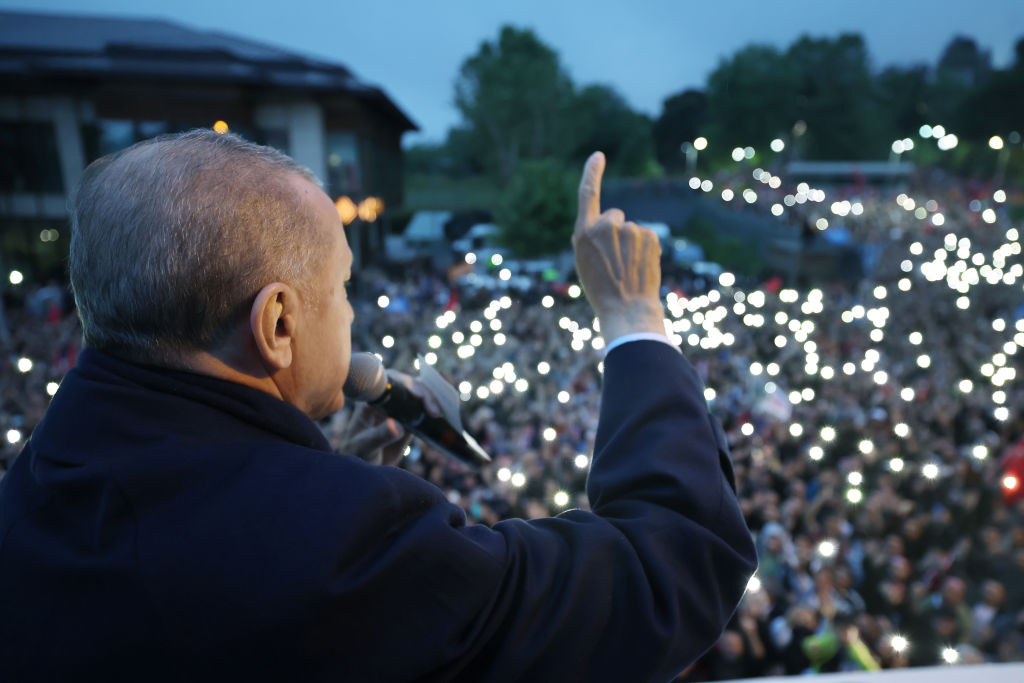
The Erdoğan era lives on. This much was assured on Sunday after Turkey’s longtime leader Recep Tayyip Erdoğan emerged victorious in the presidential runoff against opposition challenger Kemal Kılıçdaroğlu.
That Erdoğan managed to survive the single biggest test to his leadership is remarkable given the state of Turkey’s economy and lingering public anger over the government’s response to powerful earthquakes in February that left at least 50,000 people dead. What his victory means for Turkey’s future, as well as the wider world, is the question now on many minds.
For Turkey, Erdoğan’s third and final term will mean “a continuation of today,” says Galip Dalay, an associate fellow at the London-based Chatham House think tank. Under Erdoğan, who first came to power as Turkey’s Prime Minister in 2003 (a role in which he served for 11 years before becoming President in 2014), the country has backslid into authoritarianism. He has consolidated power through constitutional changes, eroded the country’s democratic institutions, including the judiciary and the media, and jailed opponents and critics, many of them journalists. His efforts have earned Turkey the designation of being one of the world’s top 10 autocratizing countries, according to Sweden’s V-Dem Institute. In 2018, Freedom House downgraded the country’s status from “partly free” to “not free.”
More from TIME
With a further five years at the helm, it’s unlikely that Erdoğan will choose to change tack on his domestic agenda. If anything, he is likely to go even further. “When autocrats face an unstable domestic context, they double down on repression,” says Gönül Tol, the author of Erdoğan War: A Strongman’s Struggle at Home and in Syria. While Erdoğan could plausibly bow to pressure to return to more orthodox economic policies in order to restore financial stability in the country (a move that he appeared to foreshadow by including his former economic czar, Mehmet Şimşek, at a campaign event), Tol says that Erdoğan is unlikely to relent when it comes restoring the country’s democratic credibility. “We’ve come to a point [where] he’s undermined rights and institutions to such an extent that we cannot call Turkey a democracy anymore,” she says, noting international electoral observers’ verdict that Turkish elections, while ostensibly free and competitive, are nonetheless unfair. “We are coming to a point where Turkey will turn into a country where elections may not matter.”
The repercussions of Erdoğan’s victory won’t just be confined to Turkey. It will have major international consequences—not least for NATO. Unlike the alliance’s other members, Turkey has gone out of its way to forge close ties with Russia. In 2017, Ankara controversially agreed to purchase an S-400 missile defense system from Moscow. While most other countries have sanctioned Russia in the aftermath of its full-scale invasion of Ukraine, Turkey has continued to do business with Moscow. In a recent interview with CNN, Erdoğan touted his “special relationship” with Russian President Vladimir Putin and reaffirmed Turkey’s lone opposition to Sweden joining NATO. (Ankara previously blocked Finland and Sweden from joining the military alliance, citing concerns over their support for Kurdish militants that Turkey and the U.S. consider terrorist organizations; while it ultimately lifted its opposition to Finland, who has since become NATO’s 31st member, its veto on Stockholm’s accession stands.)
Over the next five years, “You’ll see the strengthening of that [Erdoğan-Putin] relationship further,” Tol says. “He’s used the Sweden and Finland accession into NATO as a trump card to extract concessions from the Western world. And he has in many ways, so he’s going to try to milk that further.”
Still, most analysts expect that Erdoğan will ultimately acquiesce to Swedish membership—if not before NATO’s upcoming Vilnius summit in July, then perhaps by the end of the year. “Erdoğan cherishes Turkey’s presence in NATO because he thinks that it gives him further leverage in international affairs,” says Dalay. Indeed, Erdoğan has sought to portray Turkey as a valuable diplomatic mediator between Russia and the West, and has pushed to convene peace talks between Russia and Ukraine, just as it helped broker a key grain export deal between the warring countries last year.
Erdoğan’s victory could also have decisive consequences for the roughly 3.6 million Syrian refugees in Turkey. While Erdoğan did not go so far as Kılıçdaroğlu in vowing to expel all refugees from the country—a move the latter made following the first round of voting, in an apparent bid to chip away at his rival’s support among nationalists—Erdoğan noted that his government’s plans to build hundreds of thousands of homes in northern Syria would facilitate their voluntary return.
As much as a lot will depend on how Erdoğan chooses to define his last term—and, by extension, his own legacy—a lot will also depend on how the world chooses to respond to his victory, particularly the West. In the global battle between democracy and authoritarianism, Turkey is regarded as firmly within the latter’s camp, alongside fellow backsliding countries Hungary, India, and Brazil.
“Is the West ready to confront a more authoritarian Turkey?” asks Tol. “Or are they going to keep this transactional relationship and say, ‘As long as Erdoğan keeps Syrian refugees in Turkey, we can work with him, we can tolerate him.’”
More Must-Reads from TIME
- How Donald Trump Won
- The Best Inventions of 2024
- Why Sleep Is the Key to Living Longer
- Robert Zemeckis Just Wants to Move You
- How to Break 8 Toxic Communication Habits
- Nicola Coughlan Bet on Herself—And Won
- Why Vinegar Is So Good for You
- Meet TIME's Newest Class of Next Generation Leaders
Write to Yasmeen Serhan at yasmeen.serhan@time.com